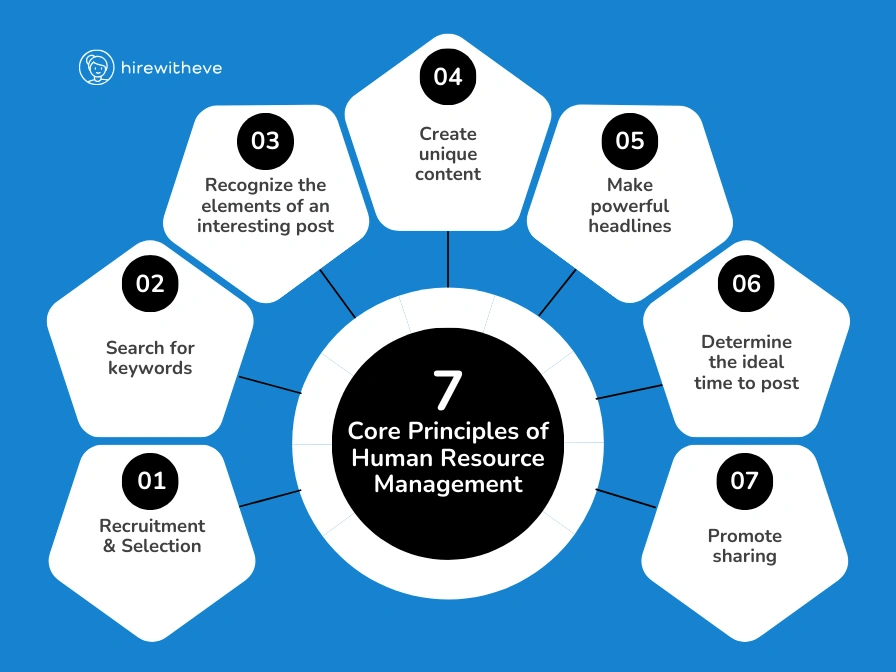7 Core Principles of Human Resource Management Every HR Professional Must Master
7 Core Principles of Human Resource Management Every HR Professional Must Master

Imagine trying to build a house without a blueprint — it would be chaotic, and inefficient, and the results would likely fall short. The same goes for human resource management without understanding its fundamental principles.
HR professionals are the architects of workplace culture, and mastering the core principles of HR is key to organizational success. These principles act as the blueprint, ensuring that talent is nurtured, performance is managed, and legal compliance is maintained.
Let’s explore the seven essential human resource principles every HR professional must know to create a thriving, well-functioning workplace.
Table of contents
What is Human Resource Management?
According to the Society for Human Resource Management (SHRM), Human Resource Management (HRM) is the strategic approach to the effective management of people in an organization, ensuring they help the business gain a competitive advantage.
HRM focuses on maximizing employee performance and ensuring that employees align with the organization’s objectives. It encompasses various functions such as recruitment, training, performance management, and employee relations, all of which contribute to creating a productive, positive workplace environment.
What is Human Resources and how is it different from Human Resource Management?
Human Resources (HR) refers to the people who make up the workforce of an organization. They are the individuals who contribute their skills, talents, and efforts toward achieving the goals of a business. HR encompasses all employees from entry-level to top management, and the term emphasizes that people are valuable resources just like capital or equipment.
While Human Resources refers to the workforce itself, Human Resource Management (HRM) is the structured and strategic management of this workforce. HRM involves practices such as recruiting, training, performance evaluation, and ensuring employee satisfaction and productivity. HR is about the people, and HRM is about managing these people to enhance their contributions to organizational success.
For example, if a company’s employees (the human resources) are the lifeblood, then HRM acts as the circulatory system, ensuring that these employees are well-supported, trained, motivated, and aligned with the company’s objectives.
What Are the 7 Core Principles of Human Resource Management?
Here are 7 basic principles of Human Resource Management (HRM) that every HR professional should know:

Recruitment & Selection
Attracting and hiring the right talent is the foundation of HRM. Effective recruitment ensures that the organization finds candidates who not only possess the required skills but also align with the company’s culture and values.
Employee Training & Development
Continuous learning and development are essential for employee growth and for the organization’s success. HR should implement programs that help employees enhance their skills and adapt to changing industry demands.
Performance Management
Monitoring and managing employee performance is crucial. Setting clear objectives, giving feedback, and conducting regular evaluations ensure employees are aligned with organizational goals and contribute effectively.
Compensation & Benefits
A fair and transparent compensation structure keeps employees motivated. This includes salaries, bonuses, health benefits, and other perks that incentivize performance and retain talent.
Compliance with Labor Laws
HR must ensure the company complies with labor regulations, including employment contracts, workplace safety, equal opportunities, and fair treatment to avoid legal complications.
Employee Relations
Fostering positive relationships between employees and the organization is critical. HR is responsible for managing conflicts, ensuring a supportive work environment, and addressing grievances.
Diversity & Inclusion
Encouraging a diverse workforce and creating an inclusive environment ensures different perspectives are respected, leading to innovation and a competitive edge.
These principles serve as the backbone of effective human resource management, helping HR professionals create a healthy and productive workplace.
Conclusion
Mastering the seven core principles of Human Resource Management (HRM) is essential for building a strong and engaged workforce. These principles guide HR professionals in navigating recruitment, performance management, compliance, and more, ensuring the organization’s success.
To further enhance your HR processes, platforms like HirewithEve can make a significant difference. By leveraging its advanced hiring assessments, you can ensure that the right candidates are hired from the start, reducing turnover and boosting employee satisfaction.
Combining these HRM principles with the right tools can help create a more resilient and productive workplace.
Target Your Talent
Unlock tailored solutions for your recruitment and hiring needs with Eve Platform's extensive case study library.
Subscribe now to enhance your HR expertise and excel in your role.
Free Resources

Transforming Hiring: 7 Key Recruiting Metrics
Enhancing recruitment processes with data-driven insights for better hiring outcomes.

Reducing Hiring Bias with Hirewitheve.
Utilizing Hirewitheve to combat bias and streamline recruitment processes effectively.

Hiring Detail-Oriented Candidates
HirewithEve enhances hiring by accurately assessing candidate's attention to detail-oriented.
